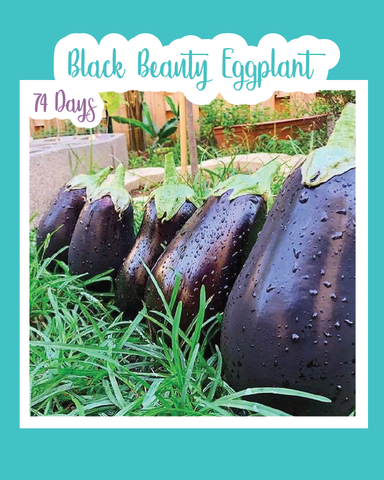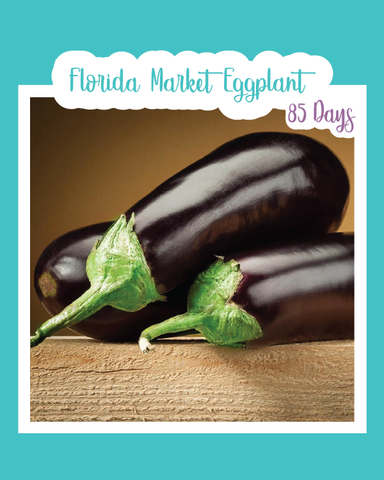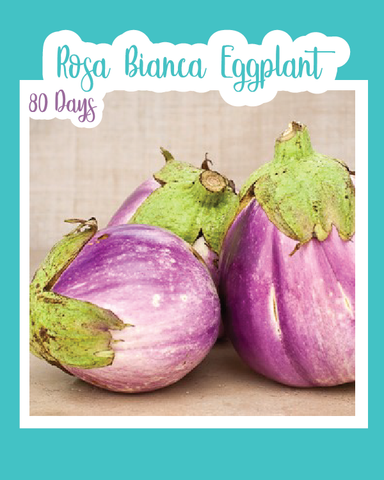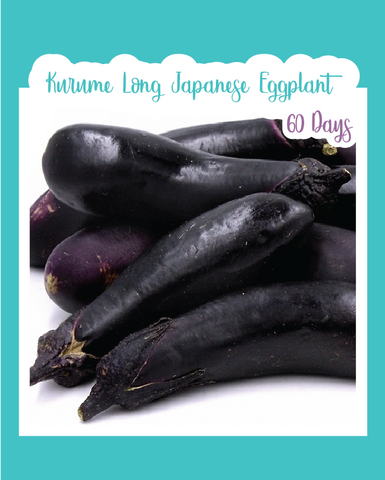
Casper Eggplant
Seed Count: Approx. 15 Seeds
Days to Maturity: 70 Days from transplant
Description: Casper eggplants are one of my absolute favorite eggplant varieties. This heirloom originated from France, and grows on compact plants, making them the perfect variety for containers and small space gardens. The 5-7 inch, tear drop shaped fruits have smooth ivory skin and flesh, and don't have to be peeled, if they are harvested while they're skin is still shiny. They have a mild, almost mushroom like flavor, and fine silky texture. It is my favorite variety to eat grilled. They are also great in soups, stews, and roasts. Casper eggplants are quite prolific and are early producers. I also find them to be quite ornamental among their green foliage. They are easy to grow, and do well just about anywhere in the US, since they don't mind cooler weather. The Casper eggplant is definitely in my top 3 favorite eggplant varieties. In case you didn't already know, my top 3 eggplants, in this order, are the Black Beauty, the Casper, and the Rosa Bianca. Gotta collect them all Mint2Grow style.
How To Grow
Sowing: Places with long growing seasons can direct sow their seeds when the soil reaches 70 degrees F. However, for short growing seasons, it’s best to start seeds indoors. About 8-10 weeks before the last spring frost, plant the seeds in pots 1/4" deep. Keep them in a sunny window or under a grow light, maintaining a temperature of around 80 degrees. Germination of eggplants can be spotty, and may take several weeks. Keep the seedlings moist, and provide organic matter for the best development. When the average air and soil temp. reach 70 degrees, or about 3 weeks after the last frost, plant seedlings in well drained soil in full sun; for fullest growth, allow each plant 2-3' in all directions. Eggplants also grow very well in containers.
Growing: Eggplants thrive in the full heat of the summer; row covers, black plastic, or other methods to conserve heat may be necessary in some climates. If temperatures threaten to fall below 55 degrees F, cover the plants. Keep the soil evenly moist, and apply fertilizer or organic matter once monthly. I use a mixture of fox farm big bloom and fish emulsion every month to get loads of flower and fruit development. Keep in mind that aphids, hornworms, and white fly can be big pests to this plant.
Harvesting: This eggplant is known for being especially prolific, so get ready for lots of harvesting. When the skin of an eggplant begins to take on a high gloss, it is nearly ripe. To test for ripeness, press gently on the skin; if the flesh remains indented, it is ready to be harvested. Eggplant reach their best eating quality at about 1/2 their mature size, since over-sized eggplant can turn tough and bitter. For freshest taste, use immediately. If necessary, eggplant can be stored in the refrigerator for up to a week. If the seeds inside begin to turn brown, this indicates that your eggplant is overripe.




